|
|
|
Sort Order |
|
|
|
Items / Page
|
|
|
|
|
|
|
| Srl | Item |
| 1 |
ID:
182568
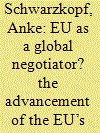

|
|
|
|
|
| Summary/Abstract |
This paper aims to account for the EU’s role in multilateral negotiations at the UNGA by looking at the negotiations on the enhanced observer status. During the negotiation process, the EU experienced significant opposition and had to accept an intermediate setback in form of a postponement of the vote. Despite this, the EU’s enhanced observer status was adopted by the UNGA in May 2011 as resolution 65/276. This research contributes to the understanding of the EU as an actor in multilateral negotiations and the interaction between state and non-state actors. I argue that the EU is in the process of establishing itself as an active and recognized actor at the UN and determining its role as a highly integrated regional organization and non-state entity in the state-centric environment of the UNGA. I analyse the negotiation process and the final agreement through the lenses of a bargaining approach and as an alternative, mutual recognition as global justice.
|
|
|
|
|
|
|
|
|
|
|
|
|
|
|
|
| 2 |
ID:
182567


|
|
|
|
|
| Summary/Abstract |
Religion has always been an important factor in American foreign policy. From the ‘holy wars’ against the Indians in the pre-independence period to the ‘crusade’ against Iraq in 2003, faith and religion have shaped the policies of American administrations in all periods. As Bonnell observed in 1971, ‘without a single exception. . .all presidents have publicly avowed their trust in God’. And even if the president was not a religious individual before moving to the White House, Billy Graham noted, they all ‘left the presidency with a very deep religious faith’. The same can be applied to Donald Trump whose presidency witnessed important domestic and foreign policy decisions that can be linked to religious motives. This is especially clear when one takes into consideration that around three-fourth of evangelicals and born-again Christians voted for him in the elections and Trump’s statement before the House elections that ‘nobody’s done more for Christians and evangelicals’ than him. This study will analyze the religious characteristics of Donald Trump and the members of his foreign policy team, such as Mike Pence and Mike Pompeo, and how their religious identity affected the foreign policy decisions of the Trump administration.
|
|
|
|
|
|
|
|
|
|
|
|
|
|
|
|
| 3 |
ID:
182566
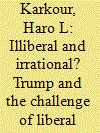

|
|
|
|
|
| Summary/Abstract |
Building on a growing body of literature on the application of Morgenthau’s ethics to post-Cold War US foreign policy, this article applies Morgenthau’s concept of irrationality to Trump’s foreign policy. Based on this application, the article highlights the limit of rationality in Morgenthau’s theoretical analysis. Specifically, the article argues, pace neo-realist critiques of ‘liberal hegemony’, that Trump reveals an empirical puzzle: US foreign policy can be both irrational and illiberal simultaneously in the pursuit of nationalistic universalism. This is the case, the article argues, because nationalistic universalism in Morgenthau’s analysis is not rooted in liberalism per se but the dynamics of liberal modernity. The Trump puzzle thus reveals an on-going tension between rationality and liberal modernity in Morgenthau’s theoretical analysis: rationality offers an insufficient tool to take upon the challenge of liberal modernity from which Trump’s nationalistic universalism stems. This, the article concludes, leaves Morgenthau’s concept of interest ‘defined in terms of power’ open to misappropriation to ends contrary to their original aim: furthering nationalistic universalism, rather than limiting power.
|
|
|
|
|
|
|
|
|
|
|
|
|
|
|
|
| 4 |
ID:
182570
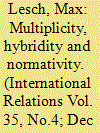

|
|
|
|
|
| Summary/Abstract |
In 2014, Germany became the 173rd state to ratify the UN Convention against Corruption (UNCAC) – after more than ten years of disputes in the German parliament. To make sense of the protracted debates about ratifying UNCAC, the article follows the recent introduction of Luc Boltanski’s pragmatic sociology to International Relations (IR). I argue that this approach opens new avenues for researching normativity in hybrid arrangements of multiple, overlapping orders of worth and through ongoing tests of the right evaluation of a situation. I show that the belayed ratification of UNCAC in Germany was the result of the hybridity inherent to norms against corruption. In the debates, members of the German parliament relied on competing normative inventories to translate the term ‘public official’ to the German context and to settle the meaning of corruption. This article contributes to IR norm research by unpacking normative multiplicity and contradictions that undergird international norms and disputes about them.
|
|
|
|
|
|
|
|
|
|
|
|
|
|
|
|
| 5 |
ID:
182569
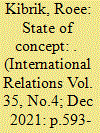

|
|
|
|
|
| Summary/Abstract |
This paper proposes a typology of four possible states of concepts: unquestioned, contested, essentially contested, and destabilized. The typology serves as a frame of reference and as an analytical tool for IR researchers who wish to study concepts and conceptualizing processes as a way of understanding politics. It argues that, within a context, every concept is in one out of four possible states. The typology rests on the relationship between experiences, perceptions, and concepts, aiming to rectify the lacuna of minimal attention to the experiences of many IR works which mainly focus on the inter-subjective sphere and actor-structure tensions. Thus, using the example of sovereignty in Jerusalem during the Israeli-Palestinians negotiations (1993–2001), a new state of concept, the destabilized state, is introduced.
|
|
|
|
|
|
|
|
|
|
|
|
|
|
|
|
| 6 |
ID:
182571
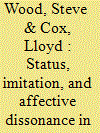

|
|
|
|
|
| Summary/Abstract |
This article explores the interplay of status, imitation and affective dissonance in international relations. Some states and nations selectively imitate others to correct perceived status deficits. Over time imitation can diminish ideals of group distinctiveness and independence from models and norm-setters, stimulating a condition we term affective dissonance. This complex of processes underlies some tensions in contemporary world politics. We apply the propositions to case studies of Russia and China whose leaders assert themselves as the principal loci and prescribers of national authenticity.
|
|
|
|
|
|
|
|
|
|
|
|
|
|
|
|
|
|
|
|
|